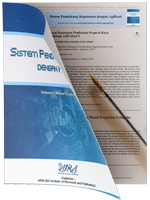Implementation of a Decision Support System for Digital Marketing Strategy Using AHP and EDAS
DOI:
https://doi.org/10.55537/spk.v4i1.1098Keywords:
Decision Support System, Digital Marketing, AHP, EDAS, Marketing StrategyAbstract
Digital marketing is a crucial element in modern business strategies, yet its effectiveness is often influenced by various factors such as market trends, customer preferences, and advertising efficiency. This study aims to optimize the digital marketing strategy at Toko Sumber Perabot dan Elektronik using a Decision Support System (DSS) based on the Analytical Hierarchy Process (AHP) and Evaluation based on Distance from Average Solution (EDAS) methods. The AHP method is used to determine the priority weight of each marketing criterion, while the EDAS method ranks alternative strategies based on their distance from the average solution. The study results indicate that the social media advertising based on market trends strategy achieved the highest ranking with a final score of 0.931, demonstrating greater effectiveness compared to other alternatives. This approach enables the store to enhance its competitiveness and digital marketing efficiency. Additionally, the AHP-EDAS method proves to reduce subjectivity in decision-making and provides more accurate insights for determining the optimal marketing strategy.
Downloads
References
O. Okfalisa, W. Anggraini, G. Nawanir, S. Saktioto, dan K. Y. Wong, “Measuring the effects of different factors influencing on the readiness of SMEs towards digitalization: A multiple perspectives design of decision support system,” Decision Sci. Lett., vol. 10, no. 3, hlm. 425–442, 2021, doi: https://doi.org/10.5267/j.dsl.2021.1.002.
A. M. Abd-Elwahab, A. G. Mohamed, dan E. M. Shaaban, “Microservices-driven enterprise architecture model for infrastructure optimization,” Future Bus. J., vol. 9, no. 1, Nov. 2023, doi: https://doi.org/10.1186/s43093-023-00268-3.
G. Chornous, Y. Fareniuk, V. R. Giedraitis, E. Ulvidienė, dan G. Kharlamova, “A data science-based marketing decision support system for brand management,” Innov. Market., vol. 19, no. 2, hlm. 38–50, 2023, doi: https://doi.org/10.21511/im.19(2).2023.04.
L. K. de Morais et al., “Differential evolution framework for budget optimization in marketing models with saturation and adstock effects,” Procedia Comput. Sci., vol. 242, hlm. 520–527, 2024, doi: https://doi.org/10.1016/j.procs.2024.08.097.
A. Ben Mrad dan B. Hnich, “Intelligent attribution modeling for enhanced digital marketing performance,” Intell. Syst. with Appl., vol. 21, p. 200337, Mar. 2024, doi: https://doi.org/10.1016/j.iswa.2024.200337.
J. R. Saura, V. Škare, dan D. O. Dosen, “Is AI-based digital marketing ethical? Assessing a new data privacy paradox,” J. Innov. Knowl., vol. 9, no. 4, p. 100597, Oct. 2024, doi: https://doi.org/10.1016/j.jik.2024.100597.
Y.-P. Yuan et al., “Government digital transformation: Understanding the role of government social media,” Gov. Inf. Q., vol. 40, no. 1, p. 101775, Jan. 2023, doi: https://doi.org/10.1016/j.giq.2022.101775.
F. Y. Tam dan J. Lung, “Digital marketing strategies for luxury fashion brands: A systematic literature review,” Int. J. Inf. Manage. Data Insights, vol. 5, no. 1, p. 100309, Jun. 2025, doi: https://doi.org/10.1016/j.jjimei.2024.100309.
H. Subramanian, P. Angle, F. Rouxelin, dan Z. Zhang, “A decision support system using signals from social media and news to predict cryptocurrency prices,” Decis. Support Syst., vol. 178, p. 114129, Mar. 2024, doi: https://doi.org/10.1016/j.dss.2023.114129.
V. Timonen, G. Foley, and C. Conlon, "Quality in qualitative research: a relational process," Qualitative Research Journal, vol. 24, no. 1, pp. 1-16, 2024, doi: https://doi.org/10.1108/qrj-07-2024-0153.
C. Zhao, J. Chen, L. Li, S. Gui, and Q. Zhou, "A qualitative study of undergraduate nursing students’ experience of clinical placement based on Nvivo software - a service learning theory perspective," Applied Mathematics and Nonlinear Sciences, vol. 8, no. 2, pp. 1-10, 2024, doi: https://doi.org/10.2478/amns-2024-2942.
J. R. Saura, V. Škare, and Đ. Ozretić Došen, “Is AI-based digital marketing ethical? Assessing a new data privacy paradox,” Journal of Innovation & Knowledge, vol. 9, no. 4, p. 100597, 2024, doi: 10.1016/j.jik.2024.100597.
H. Hari and A. Sharma, “Exploring ethical frontiers of artificial intelligence in marketing,” Journal of Responsible Technology, vol. 21, p. 100103, 2025, doi: 10.1016/j.jrt.2024.100103.
S. Vatankhah, M. Darvishmotevali, R. Rahimi, S. M. Jamali, and N. Ale Ebrahim, “Assessing the application of multi-criteria decision making techniques in hospitality and tourism research: A bibliometric study,” International Journal of Contemporary Hospitality Management, vol. 35, no. 7, pp. 2590–2623, 2023, doi: 10.1108/IJCHM-05-2022-0643.
V. C. Gonçalves, M. M. Silva, and A. C. Pereira, “Artificial Intelligence and Its Ethical Implications for Marketing,” Emerging Science Journal, vol. 7, no. 2, pp. 1–10, 2023, doi: 10.28991/ESJ-2023-07-02-01.
Downloads
Published
How to Cite
Issue
Section
License
Copyright (c) 2025 Pradani Ayu Widya Purnama, Indra Irawan, Nadya Alinda Rahmi, Desi Ardila, Kaila Azahra, Mutiara Sakinah

This work is licensed under a Creative Commons Attribution-ShareAlike 4.0 International License.








